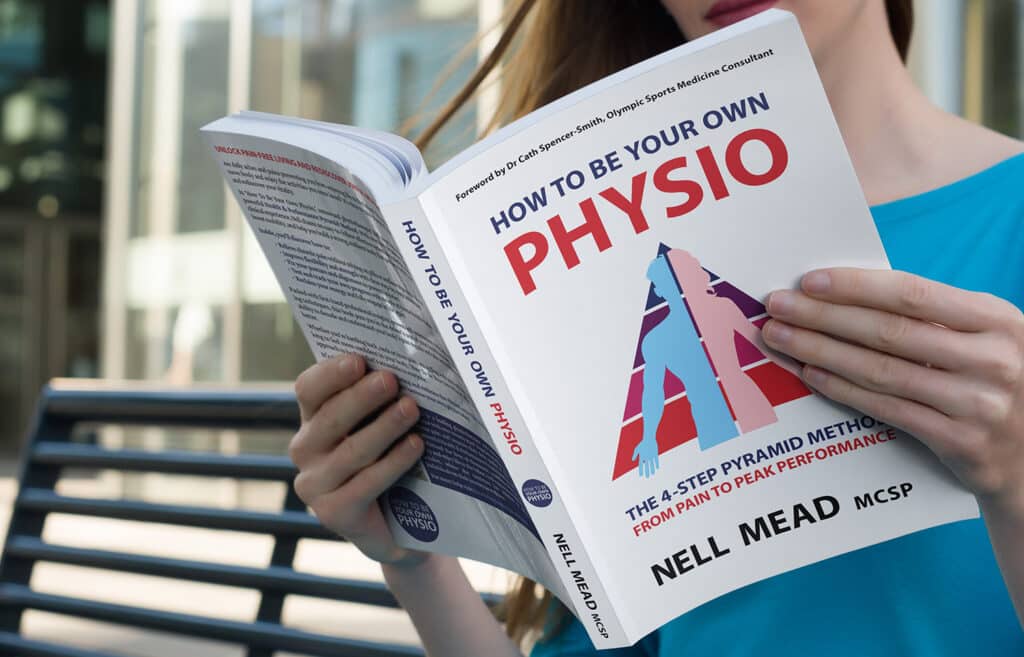Back in October, I started a series of blog posts detailing Sarah Key’s theory on back pain. I wrote about spinal anatomy and explained how the spine should work in a “normal” situation, and I followed that up by writing about the “stiff spinal segment” and “facet joint arthropathy”— the first two of Sarah’s five stages of back pain. These posts — along with my companion pieces about Sarah’s exercises — the appeasing exercise and the back block — remain my most searched-for articles — so it’s time to continue the series! Last month I wrote about stage 3: the acute locked back; and now it’s time for stage 4: the disc prolapse.
As a disc progressively loses its water content, it bulges like a punctured car tyre whenever it takes weight. When you see a bulging disc on an MRI scan, it does not necessarily mean that the disc is torn or leaking (yet) — it may simply be dehydrated and sagging.
Focal bulge at the back of the disc, leaking acidic fluid around the nerves
However, this isn’t cause for complacency: if your disc is dehydrating, the jelly-like nucleus in the middle of it isn’t healthy. When the jelly is healthy and relatively liquid, nutrients can reach the centre of the disc at around the same speed as waste products are expelled. But as it dries, the fluid exchange slows down. Waste is more acidic than nutrients, so the environment inside the disc becomes increasingly acidic and toxic…
Most of the time, especially in the early stages, the fibrous disc wall can take the strain; but if you are unlucky or leave your grumbling disc to grumble for too long, you may develop cracks at the points of greatest stress — usually at one of the back corners. At the same time, the jelly-like centre of the disc (nucleus) loses cohesion. After excessive twisting and lifting, the jelly can sometimes poke out of the crack in the wall where it is weak; and sometimes this jelly can leak acidic chemicals from the inside of the disc onto the spinal nerve root, which causes extreme and lasting pain. If the nerve root affected forms part of the sciatic nerve — then acute “sciatica” may result. This is the true meaning of “slipped disc” — the whole disc does not slip, but the contents may.
For many, this results in a trip to A&E, and sometimes in surgery. But it’s a situation where the knife can be overused — because for many people, the cracking of the annulus and the leaking of the acid soup from the nucleus can be a blessing in disguise, because — like lancing a boil — the disc is finally clear of the toxic material and can heal.
While A&E is certainly the route you should take if you have any signs of acute neurological issues (such as loss of control over your bladder or bowel, numbness in the genital area, or loss of power in your legs); what most people need in this situation is calm — a couple of weeks of relative rest (you won’t feel up to doing anything strenuous!) while you flush the acid out of your spinal canal: drinking lots of water and doing the appeasing exercise multiple times per day. You need to see your doctor and get medication that allows you to move as normally as possible (Sarah generally recommends a combination of pain killers and muscle relaxants; but the exact drugs should be down to you and your doctor). And if you know a physiotherapist who is confident enough to deal with the situation, I do recommend seeing them as soon as possible, to minimise any muscle spasm that could compromise your recovery, and restore normal movement patterns as quickly as possible.
Are you having a horrible time with your back and think you may have a disc prolapse? Take heart from the fact that lots of people who think they have a disc prolapse, actually have one of the earlier stages of back pain — but whether you do or you don’t, the sooner you get yourself sorted out, the better. So please don’t hold off — call Nell on 0207 175 0150 and let us see how we can help you, starting with a physiotherapy assessment.







